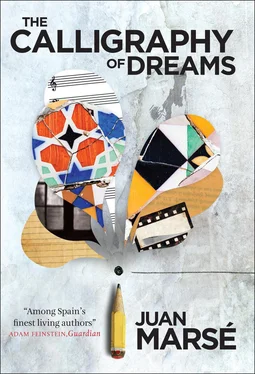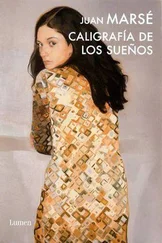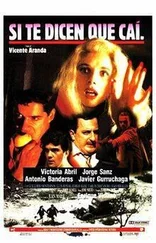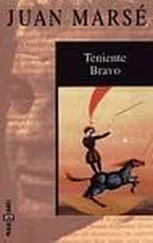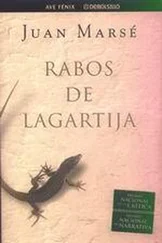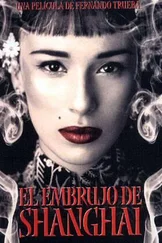Shortly afterwards, Señora Mir and Violeta leave their building and walk arm-in-arm down the centre of the street, fresh from the hair salon and dressed to the nines. They walk quickly and nervously, whispering and leaning against one another. Yet again, the mother is accompanying her daughter to the dance at the Verdi, or possibly the Cooperativa La Lealtad. According to the gang, it is the mother who chooses the venue, and that always depends on the expectations roused the previous Sunday by the attention and behaviour some young man has shown to Violeta; how often he had asked her to dance, if he had offered her a drink or not, if he spoke politely and chatted to her or only wanted to get close and rub himself against her. Her mother’s got eyes in the back of her head, El Quique used to say, before you can try anything she’s spotted you.
As on every Sunday, when the two of them are passing the Rosales bar, Señora Mir relinquishes Violeta’s arm and comes in to say hello to Señora Paquita. Sometimes, after the usual question, she stays talking to her for a few minutes while she has a small glass of brandy. Violeta waits for her in the street, pacing up and down and looking thoughtful, with her hair in surprising tight curls round her pale face, wearing a short grey cloth coat with velvet collar and cuffs, red woollen gloves and lilac medium-heeled shoes. Yet again her mother has said she’ll be right out, that she will only be a minute, but Violeta knows this isn’t the case. She knows that if her mother tosses down the first drink, she’ll ask for another one and sip it slowly, losing all sense of time.
“Pour me another one, Paqui,” says Señora Mir, leaning on the bar. “I’m ruining my liver, but don’t worry, princess, it can take it. And it warms the cockles of my heart. It’s a long walk to Calle Montseny, and it’s really cold out there.”
“Why don’t you go to the Salón Verdi? It’s much closer?”
“Because the Mario Visconti Orchestra is on at La Lealtad. Their singer is fantastic, very melodious … Well, my daughter likes him.”
She coughs as she says this, and looks away. Today she has no wish to see herself reflected in her carping eyes. She is dressed and made up so strikingly she seems to have more on her than can possibly be taken in at first glance. She is spilling out of a short grey woollen coat with a rabbit-fur collar, allowing glimpses of a cherry-red blouse that matches the fierce scarlet of her lips. She appears on edge, suffering from the cold, and vulnerable, her voice hoarse and weak. She has tried to bring everything together with an elaborate toilette that must have taken hours to apply, but has been unable to camouflage the deep lines round her eyes or the sour grimace at the corners of her mouth, or to rekindle the liveliness of her eyes, the cheerful, unexpected glint that has always been her most eloquent response to the world. Her face is no longer capable of that radical transformation that gave rise to all the ribaldry, and beneath the laboriously applied cosmetics there is no disguising the face of a woman worn down by the daily grind and by a broken marriage. The coat smells of wet sheep, and hanging from her shoulder is a big leather bag with a lacy fringe. The heavy bracelets tinkle as she anxiously tugs off her gloves and raises the glass to her lips with trembling fingers, cupping her other hand to conceal it as if she was shielding it from the wind or from prying eyes.
“Have you looked at yourself in the mirror, Vicky?”
“More than I would have liked, sweetie. Don’t get at me.”
“You don’t look well,” says her friend. “You ought to stay in bed. Why don’t you let Violeta go on her own?”
“Huh, on her own! How many years is it since you’ve been dancing, my love? There are so many louts around! It sends a shiver down my spine just looking at them.” She rolls her eyes, lined with mascara and a sense of the injustice of life, and adds: “Young people today are so cruel, Paqui.”
She raises her shoulder and rubs it against her ear in a stroking gesture that conjures up luxurious furs caressing her neck, then sighs and searches desperately in her bag until she pulls out a packet of Chesterfield. She stands with the cigarette pinched between her fingers, but doesn’t light it. Instead, she skilfully rolls it to and fro, lost in her thoughts.
“Your daughter is freezing out there in the street,” says Señora Paqui. “Why don’t you tell her to come in?”
“She prefers it out there.”
“I can’t understand why you don’t let her in.”
“I would let her, but she doesn’t want to.”
“Go on, tell her I’ll give her a coffee.”
“Me? You do it. Go out and tell her, see what she says.”
“Why? What’s her problem?”
“I think it’s because of those boys at the table football. She says they make fun of her, that they’re filthy pigs. She can’t even bear to see them, and she’s right. Kids today are a worthless bunch.”
“But they aren’t here. They left a while ago.”
“It doesn’t matter. You know how stubborn she is.”
“I reckon she doesn’t like seeing you in here, Vicky.” She fills her glass of soda water to the brim. “Here. This is the only thing you should be drinking.”
“Oh no, you can pour that away.” She giggles nervously: “I’ve cut soda out of my diet, sweetie. It gives me heartburn.”
“I don’t think that’s funny.”
“Oh, Paqui, how boring you can be! Yours truly here has got her responsibilities, hasn’t she? My husband in hospital, unsure whether or not they’ll have to operate, and me running up and down all the blessed day. And if you knew how little I want to go dancing in this cold. But I have to bring a little happiness into her life, don’t I? What else can I do? She’s so strange, poor thing. How are we going to find her a boyfriend if she never goes out?” she observes her daughter in the street through the steamed-up glass of the door. “Look at her. She’s pretty when she makes an effort, don’t you think, Paqui?”
This scene is repeated every Sunday, with very few variations, with or without permed hair, with or without fake-luxurious furs on her shoulders, but always with Violeta waiting out in the street for her, the habitual prelude to dancing. Also during the week, at any time of day. Whenever Señora Mir is coming or going past the bar, she stops and enters, and asks the eternal question, the real and only reason for appearing, the question she doesn’t appear to want to give up on, however often she is disappointed. It frequently precedes a greeting or any other kind of polite formula, even her urgent desire for a drink:
“Any news, Paqui?”
For the first time, Señora Paquita allows a hint of hostility to appear in her reply, despite her friendly tone:
“News, what news, darling?”
“Goodness gracious! My letter: what other news could there be?”
“There you go again! No, I haven’t had any letter.”
“What’s the matter, princess? Are you annoyed at me?”
“I’m. …weary, Vicky.”
“I only asked a question. Won’t I even going to be able to ask you now?”
“I warned you, I told you not to get your hopes up …”
“Oh my, that’s a good one! What you told me is that I had to wait, don’t you remember? That’s what you told me … Or do you know something more you’re not telling me?”
“Of course not, Vicky. But if I were you I’d forget that letter for good … I mean, I wouldn’t keep on waiting for it. Not now.”
“Ah, but I’m not you, sweetie!”
She says this with a defiant smile, the unlit cigarette rolling between her red, shiny fingernails, but her friend knows that behind the smile lies deep distress, a persistent anguish that she finds hard to explain after such a long, useless wait, when disillusionment and resignation would be more natural. Nothing has changed in her obstinate attitude over the past six months, apart from her appearance, which is rapidly deteriorating. Despite all the make-up and the wide variety of hairdos. Stiffly erect on her stiletto heels, she controls a slight shiver at the back of her neck. She has one hand on the edge of the bar, and the other on her waist, like a bird about to take flight, and looks over her shoulder at the regulars playing cards under a gently rippling cloud of blue mist floating above their bent heads as they concentrate on the vagaries of the pack. Glancing in their direction, she catches the occasional mocking grin that possibly makes her think they are gossiping about her again, but there is no ill-feeling or bitterness or resentment in her gaze, nothing more than a mixture of disappointment and smiling bewilderment. The wide-open blue eyes are those of a woman who has suffered a kind of hallucination, somehow agreeable, but basically inexplicable.
Читать дальше
